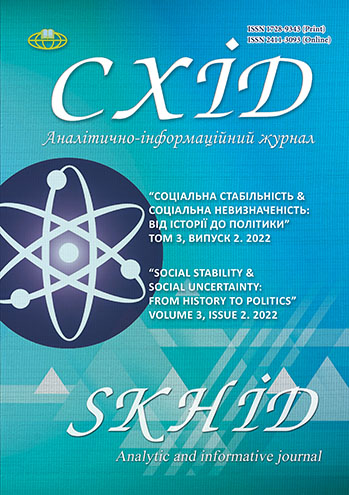2022: state in transitional era in transitional area
DOI:
https://doi.org/10.21847/1728-9343.2022.3(2).262533Keywords:
transition area, transition, transition era, public administration, strategic managementAbstract
Throughout the history of mankind, the most difficult task has always been and remains the maintenance of society and social life in an orderly, balanced and dynamic state of optimal viability. The depressing regularity of social cataclysms, wars, crises, and local conflicts convincingly testifies to the extreme complexity of this task. Such complexity, however, does not negate the need and importance of scientific support for the analysis of the causes of specific bifurcation points in the societies’ evolution and the development of new theoretical and empirical approaches to the study of their consequences, renaissances and transformations. The purpose of this article is to enrich (perhaps deepen) the modern vision of the categories of spatial and temporal transit of states in the context of a full-scale war in the heart of Europe by means of a detailed depiction of potential vectors of its direction within the framework of carefully chosen situational analytical optics.
The methodological toolkit of this study is shaped by a synergistic approach, which allows considering transition in its development in space and time depending on attractors. The principle of retrospective analysis and extrapolation makes it possible to draw parallels to confirm the predictions and avoid the gap between theory and reality.
The research highlights that in conditions of russian aggression against Ukraine the concept of transition has a clearly expressed spatial and temporal determinism and affects a number of spheres that are undergoing the greatest transformations. Within the analysis of the reformatting of specific spheres, which is now based on the nature of responding to the extreme challenge of time, this study offers a binary overview of supranational (regional) and national trends. Reconstructing the post-war agenda, it was found that security, military, humanitarian and migration policies are undergoing the biggest changes, as well as their consequences for individual states and the EU as a whole,
This article may contain forecasts and provisions that can cause discussions, but taking into account that the war is not stopped yet and the variability of the development of events, it allows to go beyond the traditional discourse of transit, provoking the exit of scientific research to a qualitatively new level of theoretical reflection of the emanation of nowadays transformational challenges.
Downloads
References
Cambridge Dictionary. Transition. https://clck.ru/wr4eT
Du Gay, P. & Scott, A. (2011). Transformation de l'État ou changement de régime ? De quelques confusions en théorie et sociologie de l'État. Revue française de sociologie, 52, 537-557. https://doi.org/10.3917/rfs.523.0537 (In French)
European Commission for Democracy through Law (Venice Commission). (2021). Ukraine Draft Law on the Principles of State Policy of the Transition Period. URL : https://www.venice.coe.int/webforms/documents/default.aspx?pdffile=CDL-REF(2021)055-e
Gradus Research Company (2022, June). Migration and socio-political attitudes during Russia’s full-scale war against Ukraine. https://gradus.app/documents/258/GradusEU_publicztion_wave2_UA_MW7vdId.pdf (In Uktainian)
Gradus Research Company (2022, May). Migration and socio-political attitudes during Russia’s full-scale war against Ukraine. https://gradus.app/documents/256/GradusEU_survey_wave1_UA_hSorts5.pdf (In Uktainian)
Holovakha, Ye.I. (1996). Transformiruyuscheesia obschestvo. Opyt sotsiologischeskogo monitoringa v Ukraine (Transforming society. Experience of sociological monitoring in Ukraine). Kyiv. Institute of Sociology of the National Academy of Sciences of Ukraine (In Ukrainian)
Mix Digital Advertising Agency (2022, July, 13). Mihratsiya naselennya Ukrayiny pid chas viyny (Migration of the population of Ukraine during the war). https://mixdigital.com.ua/blog/migracziya-naselennya-ukraini-pid-chas-vijni/
Yelagin,V. P., Mamonova, V. V., Luhovenko, N. V., Voropai, L. A. (2020). Economic prerequisites for development of financial and credit system in Ukraine: socio-humanitarian discourse in context of social transformation. Financial and Credit Activity Problems of Theory and Practice, 1(32):453-462. https://doi.org/10.18371/fcaptp.v1i32.200829
Zelinska, M., & Chechel, A. (2019). The "weak state" concept: theoretical roots and practical implementation. Skhid, (2(160), 60–65. https://doi.org/10.21847/1728-9343.2019.2(160).165724
Downloads
Published
How to Cite
Issue
Section
License
Copyright (c) 2022 Тетяна Костюк

This work is licensed under a Creative Commons Attribution-NonCommercial-NoDerivatives 4.0 International License.
1. Authors bear responsibility for the accuracy of facts, quotations, numbers and names used.
2. Manuscripts are not sent back.
3. The publisher does not always agree with the authors' opinion.
4. The authors reserve the right to authorship of the work and pass the first publication right of this work to the journal under the terms of a Creative Commons Attribution-NonCommercial-NoDerivatives 4.0 International License. This license allows others to distribute (copy) the published work for non-commercial purposes, provided there is mandatory attribution to its authors and a link to the first publication in our journal.
5. The authors have the right to conclude separate supplement agreements that relate to non-exclusive work distribution in the form in which it has been published by the journal (for example, to upload the work to the online storage of the journal or publish it as part of a monograph), provided that the reference to the first publication of the work in this journal is included.

